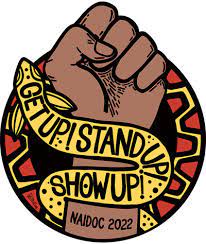NAIDOC Week - Supporting Indigenous Employees
Many companies, leaders and professionals have good intentions of increasing the representation of Indigenous employees and creating a supportive and inclusive workplace and culture. To build a truly balanced workforce, HR teams need to learn about Indigenous culture, communication, and experiences, which means asking pertinent questions. Often, these questions are avoided because of fear of offending someone. Two experts, Aunty Munya Andrews and Carla Rogers, co-directors of Evolve Communities, have the following pointers to help you understand your local Indigenous population.

How to support Indigenous employees
It’s important to create a supportive environment for Indigenous employees. The responsibility of individual human resources managers is to ensure that they are respectfully educated about Indigenous culture so they can guide their teams and leaders on how to approach day-to-day questions to positively affect outcomes. When Indigenous employees feel welcome, they will feel culturally safe.
There is a range of simple protocols that you can follow to ensure a sense of belonging, such as displaying the traditional Aboriginal map of Australia or flying the Aboriginal and Torres Strait Islander flags. Anthony Albanese recently demonstrated this when he made his debut as Prime Minister. Leaders can also become accredited allies equipped with the necessary knowledge, skills and confidence to work alongside Aboriginal and Torres Strait Islander people. Various programmes share the history of the Indigenous people and the difference in communication styles. All staff members should be provided with cultural awareness training to understand the cultural differences between Indigenous and non-Indigenous Australians.
How to build strong relationships with Indigenous people
Indigenous Australians prefer a conversation and more subtle forms of questioning rather than the short, direct dialogue that is so common with non-Indigenous Australians. As with any culture or community worldwide, there are many assumed critical differences such as the reaction to eye contact, questioning methods, time, silence, colours, humour, body language and manners. One fair question that causes no offence and is usually one of the first questions asked amongst Indigenous Australians is which clan, tribe or mob they belong to. It's perfectly acceptable for Gudia, non-Indigenous people, to ask this question; it shows an interest in their culture. Silence from an Indigenous Australian is quite normal and culturally acceptable and shows active listening.
Evolve Communities has developed the Three Steps to Stronger Relationships communication model, the R3 Approach. Whilst designed to support communications with Indigenous people, it is also helpful in situations with potential conflict or misunderstanding. The three steps are;
Reflect, Stop, pause and consider what led to this situation.
Relate, Consider things from the other person's point of view, or attempt to place yourself in their shoes without making too many assumptions.
Reconcile, If possible, work with the other person towards a solution.
This approach helps Indigenous and non-Indigenous Australians communicate in various areas of their daily lives, including family, the office and travel.
Supporting an Indigenous employee who needs to take Sorry Business
The Aboriginal kinship system is far more complex than processes carried out by non-Indigenous Australians. When Aboriginal and Torres Strait Islander peoples mourn the loss of a family member, they follow traditional ceremonies and practices, often known as Sorry Business. It’s not unusual for Aboriginal people to have many mothers, fathers, uncles and grandparents. The life expectancy of Indigenous people is almost 10 years less than non-Indigenous Australians. Therefore, ensure provisions are in place for Indigenous employees to take leave, enabling them to fulfil their cultural obligations when a family member passes.
How to acknowledge the shared history of Indigenous people and white Australians
For over 25 years, National Reconciliation Week has encouraged Australians to reflect on how they can advance the reconciliation of the nation. The silver anniversary of the National Reconciliation Week 2022 was to 'Be Brave. Make Change'. This year’s Make Change rally called to reconcile allies, accomplices, advocates and activists to stay motivated and use the tools and education available to create a just and equitable Australia. The response, engagement and commitment from supporters were overwhelming. The relationships between Aboriginal and Torres Strait Islander and non-Indigenous peoples require mutual hard work, honesty, trust, respect and understanding. It requires communities to bravely unite to make the vision for reconciliation and real change for Aboriginal and Torres Strait Islander peoples a reality.
Part of the being brave movement is being prepared to look at the truth of privilege and racism. Whilst telling the truth is hard, it's important to see history from an Indigenous perspective. The Aboriginal and Torres Strait Islander people have incredible wisdom and resilience that dates back more than 100,000 years, but the impact of shared history, colonisation and the stolen generations has impacted negatively. The shared history must be acknowledged so that non-Indigenous, Aboriginal, and Torres Strait Islander peoples can move forward together. The author Richard Flanagan said, "If we would accept it (our shared history), rather than spurn it, we might discover so many new possibilities for ourselves as a people".
Why Indigeneity is important
Indigeneity is a felt sense of identity and connection to other Indigenous peoples in Australia and worldwide. It’s about biological descent and socialisation and whether you are raised as an Aboriginal or Torres Strait Islander. It’s like the old saying, “A cup of tea is still a cup of tea no matter how much milk is added!”
Acknowledgement to Country
Acknowledgement to Country is to respect and honour Aboriginal and Torres Strait Islander Elders past, present and future, acknowledge their stories, traditions and living cultures on this land and commit to building a brighter future together. An essential cultural protocol is to address Aboriginal and Torres Strait Islander people correctly by using the name of the traditional owners and sincerely paying respects to Elders, past and present. Although people might find this nerve-wracking, it's no different from the usual manners expected when you attend a dinner party at someone's home.



